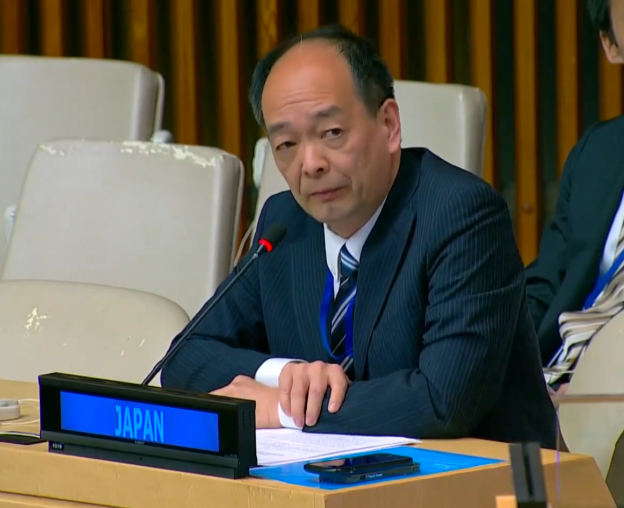Statement by H.E. Ambassador YAMANAKA Osamu, Deputy Permanent Representative of Japan to the United Nations, at the 2023 Annual Session of the UNICEF Executive Board
2023/6/13

(As delivered)
Thank you, Madam President,
Japan appreciates all the efforts taken by UNICEF, which Executive Director Russell discussed in her speech. UNICEF is an important partner for Japan, and we are working together closely to provide assistance and advocacy and to promote the SDGs and in this this regard, allow me to take this opportunity to express our appreciation to Marie-Louis for her able leadership for the executive board and to Karin for her dedication to enhance our partnership with UNICEF.
Related to the activities mentioned by Madame ED, I would like to touch upon some of Japan’s efforts.
First, regarding the response to the health crisis for hard-to-reach and marginalized communities since the outbreak of the COVID-19 Pandemic, Japan and UNICEF have been implementing "Last One Mile Support" in countries and regions around the world with the aim of "Leaving No One Behind”. On this agenda, Japan took the opportunity of the G7 Hiroshima Summit to promote equitable access to new technologies, such as Medical countermeasures, in preparation for future global health crises, in cooperation with UNICEF and others. In this connection, we commend the office of the UNICEF in Japan for hosting an event to commemorate the G7 Hiroshima Summit last month titled “Contributing to global health through shared values, innovation and public-private partnerships”.
Secondly, with regard to humanitarian assistance, Japan is responding quickly in cooperation with UNICEF. By April of this year alone, Japan has provided a total of 45.5 million US Dollars in grant assistance for humanitarian projects in Syria, Myanmar, Pacific SIDS, and Haiti. One such project targets Iraqi returnees from northeast Syria including 88,000 children and more than 47,000 women. Support includes prevention and response to gender-based violence and the provision of mental health and psycho-social support alongside health, nutrition, and education services. Among those who will be supported are unaccompanied children in detention and young people detained and released from detention. This project is expected to support efforts led by the Government of Iraq to scale up the return process.
Lastly, I would like to briefly mention the UN International Bazaar held last week. The Bazaar was a rousing success and this year’s proceeds, including 3,000 USD gathered by spouses’ club of the Japanese Mission, were donated to UNICEF’s projects in Syria, Turkey, and Ukraine, as well as in Africa.
To conclude, I would like to repeat Japan’s continued commitment to play its part, particularly its close cooperation with UNICEF towards the SDG Summit and beyond.
I thank you.
Japan appreciates all the efforts taken by UNICEF, which Executive Director Russell discussed in her speech. UNICEF is an important partner for Japan, and we are working together closely to provide assistance and advocacy and to promote the SDGs and in this this regard, allow me to take this opportunity to express our appreciation to Marie-Louis for her able leadership for the executive board and to Karin for her dedication to enhance our partnership with UNICEF.
Related to the activities mentioned by Madame ED, I would like to touch upon some of Japan’s efforts.
First, regarding the response to the health crisis for hard-to-reach and marginalized communities since the outbreak of the COVID-19 Pandemic, Japan and UNICEF have been implementing "Last One Mile Support" in countries and regions around the world with the aim of "Leaving No One Behind”. On this agenda, Japan took the opportunity of the G7 Hiroshima Summit to promote equitable access to new technologies, such as Medical countermeasures, in preparation for future global health crises, in cooperation with UNICEF and others. In this connection, we commend the office of the UNICEF in Japan for hosting an event to commemorate the G7 Hiroshima Summit last month titled “Contributing to global health through shared values, innovation and public-private partnerships”.
Secondly, with regard to humanitarian assistance, Japan is responding quickly in cooperation with UNICEF. By April of this year alone, Japan has provided a total of 45.5 million US Dollars in grant assistance for humanitarian projects in Syria, Myanmar, Pacific SIDS, and Haiti. One such project targets Iraqi returnees from northeast Syria including 88,000 children and more than 47,000 women. Support includes prevention and response to gender-based violence and the provision of mental health and psycho-social support alongside health, nutrition, and education services. Among those who will be supported are unaccompanied children in detention and young people detained and released from detention. This project is expected to support efforts led by the Government of Iraq to scale up the return process.
Lastly, I would like to briefly mention the UN International Bazaar held last week. The Bazaar was a rousing success and this year’s proceeds, including 3,000 USD gathered by spouses’ club of the Japanese Mission, were donated to UNICEF’s projects in Syria, Turkey, and Ukraine, as well as in Africa.
To conclude, I would like to repeat Japan’s continued commitment to play its part, particularly its close cooperation with UNICEF towards the SDG Summit and beyond.
I thank you.
